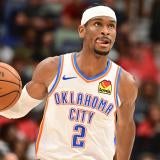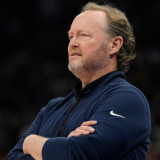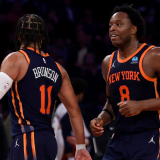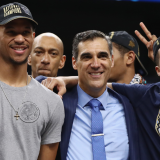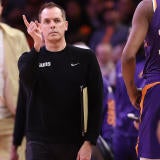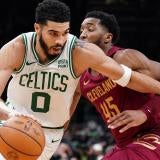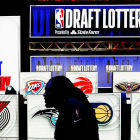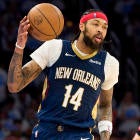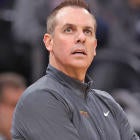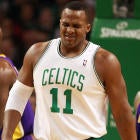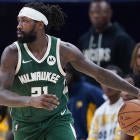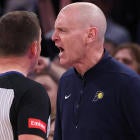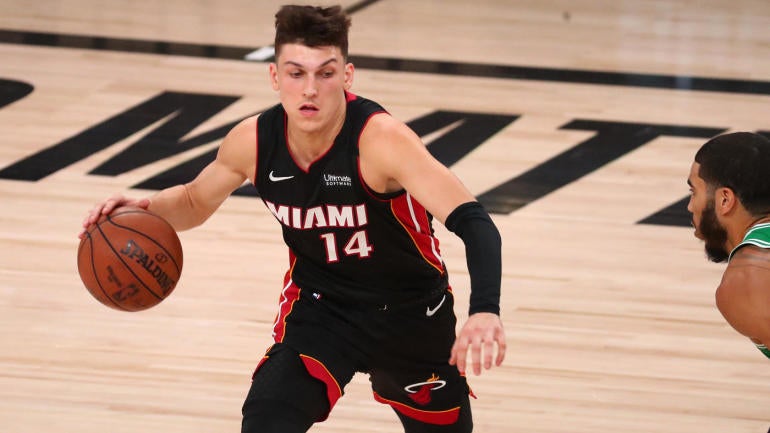
What do Tyler Herro and Magic Johnson have in common? They are the only two rookies in NBA history to score at least 35 points, grab at least five rebounds and dish out three or more assists in one of the two final rounds of the playoffs. Herro's Game 4 explosion gave him the record for points by a rookie in the conference finals, passing two-time All-Star Andrew Toney. Two spots down on that list? Johnson's eternal rival Larry Bird, who didn't reach the 37 points Herro scored in any playoff game until his fourth season.
Wednesday was no isolated incident. It was the culmination of one of the greatest rookie playoff runs the NBA has ever seen. A future superstar is emerging before our eyes. Herro has been so good that some historical context is necessary here. Just where does this rank among the greatest playoff runs in rookie history?
One rookie stands atop the rest in playoff history, and it's exactly who you'd expect. Magic Johnson's 18.3 points, 10.5 rebounds and 9.4 assists per game in the 1980 postseason is the greatest run any rookie will ever have, and it culminated in one of the most famous individual performances in league history. Until Herro plays all five positions on the way to a 42-15-7 line and Finals MVP, Johnson's place atop these rankings is secure. Others have posted more impressive numbers, but have done so on shorter runs. Kareem Abdul-Jabbar, for instance, averaged over 35 points per game in his first playoff run, but was knocked out in the second round. Donovan Mitchell and David Robinson fall in the same camp.
Among rookies who played at least the 13 playoff games that the Miami Heat have so far, Herro's 16.5 points per game ranks fifth in NBA history. The name directly above him is Alvan Adams, but the three others should excite Heat fans far more: Magic Johnson, Jayson Tatum, and the greatest Heat player of them all, Dwyane Wade.
Wade's run shares a number of similarities with Herro's. Both instances saw the promising rookie as part of an ensemble cast. The 2003 Heat were a No. 4 seed. This year's Heat were No. 5. But Wade's run ended in the second round against the No. 1 seeded Indiana Pacers. Herro buried this season's No. 1 seed, the Milwaukee Bucks, in five games. Tatum made it to the Eastern Conference Finals as Herro has, but lost in seven games. Herro would need to lose three straight to be knocked out in the same fashion, and while Tatum scored more, Herro averaged more assists and rebounds, and did so with a higher effective field goal percentage.
Tatum's role inherently made him more valuable during that run. With Kyrie Irving and Gordon Hayward out due to injury, he was Boston's leading scorer. Defenses focused on him. The Heat still run through Jimmy Butler and Goran Dragic. That makes Adams, second to Paul Westphal on the 1976-77 Phoenix Suns, the more appropriate comparison. It is also the run, aside from Johnson's, Herro would likely prefer to emulate. He reached the NBA Finals. That makes him one of only four rookies to average double-digit points in the playoffs on the way to a Finals run, joining teammate Ricky Sobers as well as two Hall of Famers: Johnson and Jack Sikma.
It makes sense intuitively. The best rookies almost never land on Finals-caliber teams. The jump from the lottery into contention is rarely achievable in a single year. Even when it is, rookies tend to be unreliable. Plenty of contending teams have had highly-drafted rookies, or unheralded ones that became stars. They just rarely play them when it counts. The stakes are usually too high for 20-year-olds.
But the Heat trust Herro explicitly. He closes games for them despite his status as a nominal reserve. Only Butler and Dragic have taken more clutch shot attempts than him on his team this postseason (14), a feat so rare that he has taken nearly twice as many clutch shot attempts as every other rookie in the playoff field combined (eight). Only two rookies this century have ever topped that: Tatum, with 15, and Derrick Rose, with 19.
Measuring actual value among all of these postseason runs, given differences in era, skill-set and role, wouldn't be possible, but for Herro's sake, it doesn't need to be. The NBA doesn't award a trophy for the greatest rookie playoff run of all time. It awards plenty of others, though, and the players we've listed at various points here have, at some point or another, accumulated most of them.
Johnson and Rose are MVPs. Johnson and Wade are Finals MVPs. Tatum is a reigning All-NBA player, and even Adams, the one-hit-wonder of the group, made an All-Star team. Herro is averaging more points per game than Ben Simmons, Tony Parker or Charles Barkley as rookies. All three of them eventually achieved superstardom.
And it's time to start wondering if Herro is destined for that sort of future as well. This isn't a blip. It isn't an accident of shooting variance either (in fact, at only 37.8 percent, he's actually shot worse in the playoffs than he did in the regular season). It is the emergence of a player that was woefully misevaluated during the draft process. We may not have foreseen this kind of performance out of Herro, but it's happening, and history says that when this kind of thing happens, it means stardom isn't far behind. If Game 4 was any indication, it might already be here.







